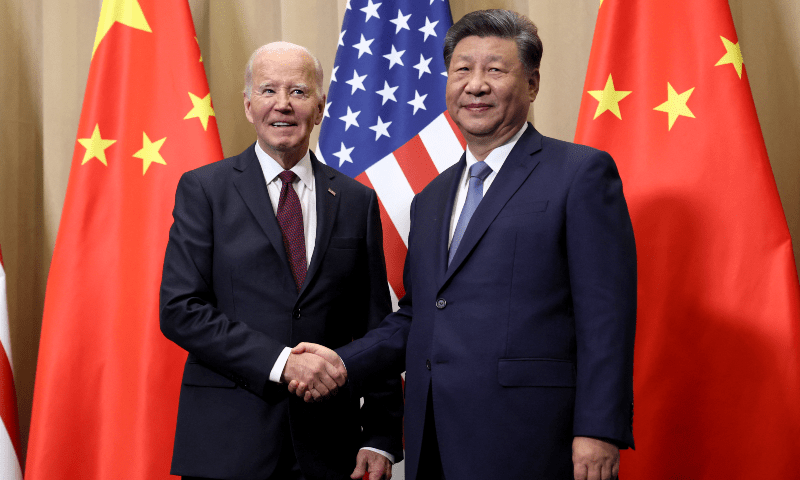• Xi says China ready to work with Trump administration for ‘smooth transition’ in bilateral ties
• Counts Taiwan among four ‘red lines’ that must not be crossed
LIMA: US President Joe Biden and Chinese President Xi Jinping agreed that human beings and not artificial intelligence should make decisions over the use of nuclear weapons, according to the White House.
“The two leaders affirmed the need to maintain human control over the decision to use nuclear weapons,” the White House said. “The two leaders also stressed the need to consider carefully the potential risks and develop AI technology in the military field in a prudent and responsible manner.”
An official Chinese government summary of the meeting echoed this point, but the foreign ministry did not immediately respond to a request for comment.
It marks a first-of-its-kind step between the two countries in the discussion of two issues on which progress has been elusive: nuclear arms and artificial intelligence.
The two countries briefly resumed official-level talks over nuclear arms in November but those negotiations have since stalled. Formal nuclear arms control negotiations have not been expected any time soon, despite US concerns about China’s rapid nuclear weapons build-up, even though semi-official exchanges have resumed.
On the issue of artificial intelligence, China and the US launched their first formal bilateral talks in May in Geneva, but those talks are not believed to have touched on nuclear weapons decision-making.
The US defence department estimated last year that Beijing has 500 operational nuclear warheads and will probably field more than 1,000 by 2030. That compares to 1,770 and 1,710 operational warheads deployed by the US and Russia, respectively. The Pentagon said that by 2030, much of Beijing’s weapons would probably be held at higher levels of readiness.
China has not formally detailed its arsenal but officially maintains a policy of no-first-use and maintaining a modern nuclear deterrence that is minimal. Officials this year urged other powers to adopt the same stance.
‘Smooth transition’
On the sidelines of an Asia-Pacific summit in Lima, President Xi in a meeting with outgoing President Joe Biden said he was ready to work with Donald Trump’s new administration for a “smooth transition” in bilateral ties.
After shaking hands to begin their meeting at the Chinese leader’s hotel in the Peruvian capital, Xi noted that Beijing’s goals for stable ties with Washington remained unchanged.
“China is ready to work with the new US administration to maintain communication, expand cooperation and manage differences, so as to strive for a smooth transition of the China-US relationship,” he said in translated comments.
At Saturday’s face-to-face was their second meeting since a landmark ice-breaking summit in California last year, their third overall, Biden said he was “very proud of the progress we both made together. Our two countries cannot let any of this competition veer into conflict. That’s our responsibility and over the last four years I think we’ve proven it’s possible to have this relationship.”
The White House said Biden had raised several key points of tension, including Taiwan that China claims part of its territory, support to Russia’s defence industry, s by China’s ally North Korea. But it was the transfer of power in Washington that hung heaviest over the meeting, with Biden and Xi both seeking to calm potentially choppy waters.
Xi warned the United States not to cross a “red line” in support for Taiwan. “Taiwan issue, democracy and human rights, pathways and systems, and development interests are China’s four red lines that must not be challenged,” Chinese state broadcaster CCTV quoted Xi as telling Biden. “These are the most important guardrails and safety net for China-US relations,” CCTV reported Xi as saying.
He also told his counterpart Joe Biden that Beijing was willing to work with the incoming administration of Donald Trump.
US National Security Advisor Jake Sullivan told reporters Biden had reinforced that it was a “time of transition” where “stability in the US-China relationship is essential”. Sullivan added however that Biden was “not a conduit” for any backchannel messages from Xi to Trump about the shape of future relations.
Published in Dawn, November 18th, 2024







